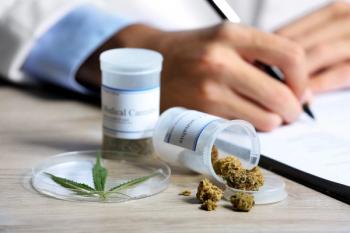
- July/August 2022
- Volume 3
- Issue 2
- Pages: 19-20
Patient and Activist Profile: Carla Basante
Carla Basante discusses how she began using cannabis about 15 years ago to manage chronic pain from a severe back injury and symptoms of multiple sclerosis (MS).
Carla Basante began using cannabis about 15 years ago to manage chronic pain from a severe back injury and symptoms of multiple sclerosis (MS). A breast cancer survivor, Carla has had two back surgeries to treat the damage caused by a bad car accident when she was in her early 40s, as well as a nerve ablation, and other procedures.
After doctors had trouble explaining the various symptoms she was experiencing after that accident, an MRI revealed she was also suffering from MS. The trauma of the back injury had “activated” her lurking MS, leading to seizures and other debilitating problems. What followed was a medicine cabinet full of powerful pharmaceutical drugs.
“Oxy, Percocet, Valium – they’d prescribe anything, even steroids,” Carla remembers. The unpleasant side effects of the medications she was initially prescribed for her conditions led her to investigate alternatives.
“My son was a factor. I wanted to be a mother, but I didn’t recognize myself,” Carla says.
She found that cannabis provided relief without the many side effects of other medications. Once she found a cannabis regimen that worked, she was able to go take herself off of 10 drugs.
“It’s horrible to live with chronic illness and chronic pain, but it’s been years since I’ve had to take steroids, and I haven’t had MS episodes,” Carla says. “If I wasn’t medicating with cannabis, I couldn’t function.”
Her research on medical cannabis also led her to Americans for Safe Access (ASA). She has attended ASA’s annual unity conference in Washington, D.C. three times, first in 2017, and has lobbied on Capitol Hill.
“That ASA conference changed my life,” Carla says. “I met patients from all walks of life – lawyers, doctors, parents of children with Dravet Syndrome.”
Carla’s direct advocacy work began when she had to go in for another back surgery and was told she couldn’t use cannabis at the hospital. After her procedure, she was sent to a rehabilitation center that weekend, the staff asked her if she was using any medications. When she told them, yes, she used cannabis, the staff said they were sorry, but this was a “no flame” facility.
“No problem,” Carla said. “I’ve got a vape pen, so no flame.”
Stumped by that, the nurse set up a medication schedule with her for her cannabis use. When the administrative folks returned to work on Monday, they told Carla she’d have to stop.
“I told them, no, we’ve already got a schedule, and it’s not causing anyone any problems,” Carla recalls. They said she would have to switch to dronabinol, the Food and Drug Administration’s (FDA)-approved synthetic tetrahydrocannabinol (THC) medicine. Instead, Carla opted for cannabis oils and medicated baked goods.
In the future, Carla would like to see cannabis be more available to those in need, and for medical facilities to provide cannabis lounges for patients so that they can get the treatment they prefer to use.
“The number of pills being doled out is frightening, particularly for our elderly population. It’s a free for all,” Carla says. “If they were able to use cannabis in different forms, it would save them from the dangerous side effects.”
Carla was back at that rehab center a year ago because her mother was receiving care there and was surprised to have the staff remember her.
“I was wearing a mask, but aides were pointing. ‘You were here before,’” Carla says. “They remembered me going outside in my wheelchair to use the vape pen.”
Carla’s self-advocacy had made an impression.
“My thing is cannabis use for facilities, hospitals, prisons, nursing, rehab, even schools – all the places that receive federal funds and say you can’t use cannabis as medicine,” Carla says. “I have a friend with a son in high school in New Jersey who is finally able to administer his cannabis in school.”
Because of her son, Carla has had to deal with the anti-cannabis messages common to schools. He was 7 years old when she started using cannabis, and she worked to educate him about “mom’s medicine”, but things changed when he got to middle school and was exposed to strident anti-cannabis messages. Carla had been showing him ASA materials and her collection of books about the medical uses of cannabis, but the conflicting messages led to arguments. He wanted her to stop.
“I’m more engaged, more active – don’t you see the difference?” Carla remembers asking him. “It’s not taking away all the pain, not curing MS, but now I’m functional. Isn’t that what we want? I wouldn’t be able to hold a job without it.”
When her son told her about a poster in his guidance counselor’s office that said cannabis use leads to cocaine and other hard drugs, she went to the school, much to her son’s embarrassment.
“Why would you have this up?” Carla asked the guidance counselor. “You’re an educator. Why would you not educate yourself?”
She remembers her son’s complaints about how she was bringing attention to her cannabis use.
“I know,” she told him. “You know how much this has helped me.”
It was a hard three years, but by the time her son got to high school, the switch had flipped. He saw the stigma was wrong. When he got to college, he discovered his university has a cannabis curriculum and took a couple of courses.
“I’ll always remember the smile on his face when he said, ‘Look what they offer!’” Carla says. “That’s the best thing ever.”
From that experience, Carla has learned that we must do cannabis education one on one, whether that is with children or medical professionals. She makes use of expert resources, but she also knows her own story makes a powerful case.
“I’m the healthiest unhealthy person, thanks to cannabis use,” Carla says.
Editor’s Note
This profile was previously published by Americans for Safe Access in their March 2022 ASA Activist Newsletter. To see the original newsletter, please visit
About the Author
William Dolphin produces Americans for Safe Access’s (ASA’s) monthly Activist Newsletter and has been part of ASA’s communications team since 2002. He is the co-author of The Medicalization of Marijuana: Legitimacy, Stigma, and the Patient Experience, an award-winning book of medical sociology, and has published hundreds of articles on cannabis and other topics. He has taught at a number of colleges and universities, including UC Berkeley, and is currently working on a book about cannabis use and mental health.
Articles in this issue
over 3 years ago
Cannabis Patient Care July/August 2022 Digital Editionover 3 years ago
Research Overview: Cannabis and Autoimmune Disordersover 3 years ago
Cannabis for Autoimmune Disease: Benefits Beyond Symptom Relief?over 3 years ago
The Knox Docs Story: A Family of Endocannabinologistsover 3 years ago
The Latest News on Cannabis and Autoimmune DiseaseNewsletter
Unlock the latest breakthroughs in cannabis science—subscribe now to get expert insights, research, and industry updates delivered to your inbox.




